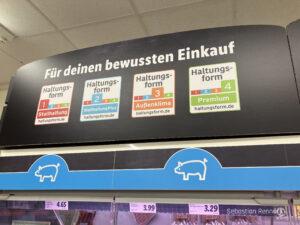German discounters boost animal welfare credentials
Aldi in Germany is introducing a German-origin label for fresh produce. Like rival Lidl, the discounter is introducing higher animal welfare standards for its own-brand meat and sausage products. The move pre-empts new animal welfare legislation and puts pressure on supermarket rivals and brand manufacturers.

‚For conscious purchases‘ The signage in Lidl’s meat department explains the different levels of animal welfare
Lidl and Aldi in Germany have set ambitious targets for higher animal welfare standards in their fresh produce ranges. By setting higher standards, the discounters aim to differentiate their own brands from the supermarkets’ branded ranges.
Aldi is currently working on the launch of an animal welfare label under the motto ‘Gutes aus deutscher Landwirtschaft’ that was launched as an industry-wide, national certification standard at the beginning of the year. At Aldi Süd, the first products with the new label are already available in the stores. To qualify for certification, the animals must be born, raised, fattened, slaughtered, cut up, processed and packaged for meat products in Germany.
Aldi plans to have one third of its meat and sausage range certified level 3 or higher by 2026. Like Lidl, it plans to convert its entire fresh meat, charcuterie and sausage range by 2030. According to market estimates, Aldi Süd’s share of fresh meat sales from farming methods 3 and 4 currently stands at 50%. Last year, Aldi Süd is estimated to have doubled its share of fresh meat sales from these higher husbandry categories. Aldi had already launched the strategic transformation project ‘Haltungswechsel’ (husbandry type change) for its own brands in 2021.
Lidl targets 30% higher husbandry forms for its own brand Metzgerfrisch by end of this year. By the end of next year the label shall cover half of the product range. In order to achieve these goals, Lidl already in 2022 had switched its complete fresh pork, beef and poultry meat and sausage products to production of German origin. As part of the ‘5xD’ (5 times Germany) initiative for the discounter’s own brand Metzgerfrisch, all the animals are born, raised, fattened, slaughtered and processed in Germany.
Since spring 2019, in Germany the voluntary ‘Husbandry Type Label’ (German: ‘Haltungsform’) has been in place for fresh, unprocessed, seasoned or marinated meat from pork, beef and poultry. The four-tier system classifies existing animal welfare programmes into levels 1 to 4. It was developed by eight food retail chains to make it easier for consumers to obtain information when shopping and is voluntary. Animal welfare level 1 represents the lowest standard, based on the minimum legal requirements for space per animal during rearing, while level 4 is the highest possible rating, including organic products.
On the government side, the Animal Welfare Labelling Act, which provides for five different levels of animal welfare for fresh pork products produced in Germany, was passed in August 2023 and came into force this month. It will be mandatory for all retailers from August 2025. It will be extended to other types of meat, such as beef and poultry, at a later date.
Related news
Mere in Lithuania: Rapid growth and a hard discount niche left open by Lidl
🎧 Hallgasd a cikket: Lejátszás Szünet Folytatás Leállítás Nyelv: Auto…
Read more >Related news
40 secure jobs, sustainable solutions – new BURGER KING® in Csepel
🎧 Hallgasd a cikket: Lejátszás Szünet Folytatás Leállítás Nyelv: Auto…
Read more >








